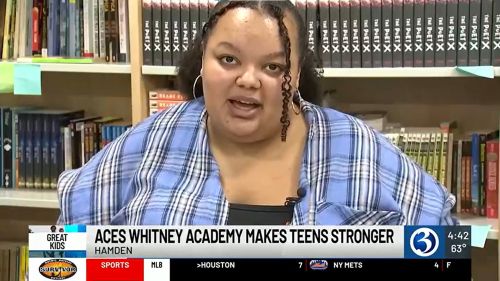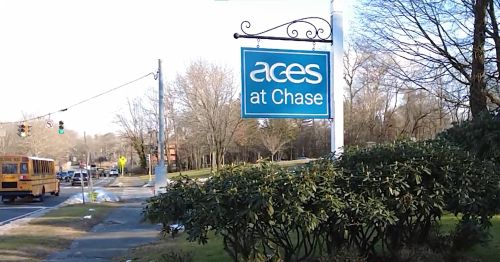-
Our Agency
- About Us
- Calendars
- Contact Us
-
Directions
- ACCESS
- ACES at Chase
- ACES International Preschool and Childcare Center
- ACES Transportation Services
- Center for Autism Spectrum and Developmental Disorders
- Central Office
- Educational Center for the Arts
- Educational Technology
- Little Theatre on Lincoln Street
- Mill Road School
- Network Services
- Staff Development / Administration
- Village School
- Whitney High School North
- Wintergreen Interdistrict Magnet School
- Human Capital Development
- Education Foundation
- News / Press
- Publications
- Request for Proposals
- Employment
- Events & Workshops
- Referrals
-
Schools & Programs
-
Special Education Schools
- Center for Autism Spectrum and Developmental Disorders
- Mead Elementary School
- Mill Road School
- Village School
- Whitney Academy EXPLORE & CREATE
- Whitney High School North
-
Magnet Schools
-
ACES at Chase
- About Us
- ACES at Chase: History & Origins
- Admissions
-
Student and Family Portal
- Breakfast and Lunch Menus
- Cancellations, Delays, and Early Dismissal
- Community Health Center
- Dress Guidelines
- Family Teacher Organization (FTO)
- Health Office
- Principal's Corner
- Monitoring Grades: PowerSchool Parent Portal
- Quick Links
- Student Handbook
- Summer Reading and Math
- Technology & Digital Citizenship
- Virtual Suggestion Box
- Document Library
- Contact Us
- Back to ACES
- Educational Center for the Arts
- Wintergreen Interdistrict Magnet School
-
ACES at Chase
- Alternative Education
- ACES Early Head Start
- ACES International
-
ACES International Preschool and Childcare Center
- About Us
- ACES International Preschool and Childcare Center Donations
- Admission Interest
- Meet the Staff - Newtown Center
- Meet the Staff - Woodbury Center
- Calendar
- Contact Us - Newtown Center
- Contact Us - Woodbury Center
- Family Portal
- Enroll Now: ACES International Preschool and Childcare Center Newtown Location
- Back to ACES
- ACES Open Choice
- Family and Community Engagement
- Magnet School Parent Choice
- School-Based Services
-
Special Education Schools
-
Services
- ACCESS Adult Vocational Services
- ACES Insurance Collaborative
- ACES UP Renewable Energy Solutions
- Alternate Routes to Certification
- Business Partnership Opportunities
- Center for Safe Schools
- Clinical Services
- Educational Technology
- Facility Rental
- Fingerprinting
- International Programming
- Marketing and Communications Services
- Network Services
- Professional Learning
- Regional Education Councils
- Regional Special Education Transportation
- Speech and Language Services
- Transportation
- World Language Services
- Find
« Back to News List
« Back to News List
Magnet School Operators Ask For $11.3 Million More From State
February 3rd, 2015
Faced with budget deficits and years of flat funding from the state, a coalition of magnet school operators are asking legislators for an $11.3 million increase in state money, amounting to about $1,000 per child.
Bruce Douglas, executive director of the Capitol Region Education Council, which operates 19 magnet schools in the Hartford region, said that in the past five years, CREC magnets have not gotten any increase in per-pupil funding. The result has been that more of the financial burden for the schools has gradually shifted to local school districts.
In the 2011 fiscal year, for instance, the state covered 73 percent of the total cost of educating a child. This year, that percentage dropped to 70 — a difference of $397 per child or a total added cost to local districts of $2.9 million, according to CREC. The coalition represents five Regional Educational Service Centers that operate more than two dozen magnet schools across the state."This is a social justice issue and it's about time the State of Connecticut get its act together with regard to funding public education," Douglas said. "It's pitting the school districts and the RESCs against each other with regard to these tuitions," Douglas said, "and this has to stop."
Thomas Danehy, executive director of the Area Cooperative Educational Services, which operates magnets in the New Haven region, said this regional inequity in the average payments is also a key issue for magnets. That inequity, he said, is the result of the Sheff v. O'Neill desegregation suit, which has led to the development of many new magnets in the Hartford area.
Mia Flowers, an eighth grader at the Wintergreen Interdistrict Magnet School, said students have worried at times "that we might have to shut down because the school did not have enough money to keep going.""The present financing structure is inherently unfair," Danehy said in an e-mail. "The funding scheme shows the state's preference to pay more in the Sheff area to resolve a lawsuit than its moral obligation to provide statewide equal funding under the law. Students in New Haven, New London, and Bridgeport are worth just as much as students from Hartford."
"Why hasn't our state taken action and funded my school out of respect for the students within the school?" she asked.
In addition to getting the state money, the magnet school operators receive a tuition payment from local districts that averages about $4,000 per pupil. For instance, Danehy said that for Wintergreen Interdistrict Magnet in Hamden, the state pays $7,900 per pupil, while the district pays $4,104.
But RESC directors say they don't want to offset their costs by raising tuition for local districts.
Eileen Howley, executive director of LEARN, the RESC for the southeastern portion of the state, said of the district's share: "I've tried to keep it as flat as possible … The goal is not to be a financial strain [for districts], but to be a solution-finder."
That has left some RESCs with deficits. Howley said she has schools with deficits. CREC also has a $5.2 million deficit for the next school year.
With a $1.3 billion state deficit, Rep. Andrew Fleischmann, D-West Hartford and co-chairman of the legislature's education committee, said: "I guess my question to this coalition is the same for a lot of folks' requests for additional funding. Where are those funds going to come from? Have you got some new revenue source?"
Fleischmann said he doesn't see where the extra dollars will come from.
Sen. Beth Bye, D-West Hartford and co-chairwoman of the appropriations committee, said she has introduced a bill that would narrow the state funding gap between the CREC magnets and the other RESC magnets.
She noted, however, that the percentage increase in state money for magnet schools in recent years has far exceeded the percentage increase in the Education Cost Sharing grants that go to the rest of the public schools.
"I'm sure they are doing incredible work," Bye said of the magnets "but there are also public schools doing great work. I think in some ways they don't have the PR."
Sen. Gayle Slossberg D-Milford, the new co-chairwoman of the education committee, said the magnet request is "part of a bigger conversation about equity in funding across the board. We really need to be looking at all of our students and what sort of funding increases they have gotten over the years."
Copyright © 2015, Hartford Courant
www.courant.com/education/hc-magnet-school-coalition-0204-20150203-story.html












